|
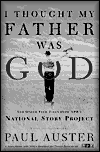
A small piece by
John Keith
John Brawley
Joan Vanden Heuvel
|
I Thought My Father Was God
"More than ever, I have
come to appreciate how deeply and passionately most of us live within
ourselves. Our attachments are ferocious. Our loves overwhelm us, define
us, obliterate the boundaries between ourselves and others. "
Paul Auster
"I Thought My Father Was God gathers
180 of these personal, true-life accounts in a single, powerful volume.
They come from men and women of all ages, backgrounds, and walks of life;
together the contributors represent forty-two states. "
Henry Holt
Links
|
|

September 1988
Poetry by
Paul Auster
|
Disappearances
by Paul Auster
"Working within the domain of consciously reduced elements,
Auster pushes language to its breaking point, locating the sayable within
the shifting tumult of the real."
Amazon
Links
|
|
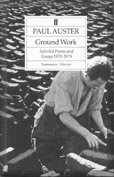
1990
Poetry by
Paul Auster
|
Ground Work
by Paul Auster
"A collection of poetry and prose from Paul Auster, the author of
"New York Trilogy" and "Moon Palace". The book is
divided into two parts. The first part is a selection from the author's
volumes of poetry published in America in the 1970s and the second part
is a collection of his essays."
Amazon
Links
|
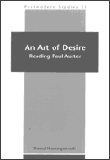
January 1999
About
Paul Auster
|
An Art of Desire: Reading Paul Auster
by Bernd Herzogenrath (Author)
"An Art of Desire. Reading Paul Auster the first
book-length study solely devoted to the novels of Paul Auster. From the
vantage-point of poststructuralist theory, especially Lacanian psychoanalysis
and Derridean deconstruction, this book explores the relation of Auster's
novels City of Glass, In the Country of Last Things, Moon Palace, and
The Music of Chance to the rewriting and deconstruction of genre conventions;
their connections to concepts such as catastrophe theory, the sublime,
Freud's notion of the 'death drive;' as well as the philosophical underpinnings
of his work. At the focus of this study, however, is the concept of desire,
an important concept in the writings of both Auster and Lacan, and the
various manifestations of this concept in Auster's novels."
Amazon
Links
|

May 2000
Introduction by
Paul Auster
|
Things Happen For No Reason: The
True Story of an Itinerant Life in Baseball
by Terry Leach, Tom Clark (Contributor),
Paul Auster
(Introduction),
David Cone (Introduction)
"This is the life story of a man for whom the American
Dream dies hard. Born in 1953 in Selma, Alabama, Terry Leach first plays
baseball as a Little Leaguer. In college, he stars at Auburn until an
arm injury threatens his future. He recovers sufficiently to pitch sidearm
and enter the independent leagues in Louisiana, which leads to his first
contract with the Atlanta Braves organization. Later, he reaches the major
leagues with the New York Mets, and in 1987 he wins ten games in a row
and finishes 11-1. The road to the top is filled with turns and potholes,
but Leach learns from them, and eventually develops a personal baseball
philosophy."
American Library Association
Links
|
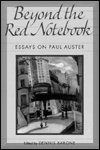
September 1995
About by
Paul Auster
|
Beyond The Red Notebook:
Essays On Paul Auster
by Dennis Barone (Editor)
"Paul
Auster? Well known author, a novelist.
No, it's better if we inspect this writer without any restrictions. Because
he is unmeasureable. Essays and fiction. Beyond the Red Notebook: Essays
on Paul Auster, this is one of the best essaycollections i've ever read.
Although it is not a fiction, you can still notice that he is discussing
about the same problems as he does in he's novels. All these essays are
each one involved with a self-seeking. Like Auster is trying to prove
that his standpoints in novels are true. I would compare Auster with Susan
Sontag. Sontag's style is similar to Auster's one. So this book is a good
one in two aspects: composition and the essays itself. So, why I put only
4 stars. Well, it always seems to me in every book that there could be
something more. But this is a great book, no doubt about that."
Argo Riistan
Links
|

January 1999
Translation by
Paul Auster
|
The Station Hill Blanchot Reader
by Maurice Blanchot (Editor), George Quasha (Editor),
Paul Auster,
Lydia Davis (Translator)
"Fiction/Literary Criticism, translated from the
French by Lydia Davis, Paul Auster and Robert Lamberton, with a foreward
by Christopher Fynsk and an afterword by George Quasha and Charles Stein,
edited by George Quasha. Maurice Blanchot, in his "rcits" and
essays alike, attends to "the haunting presence of a language that
brings language itself into question as it searches the borders of what
can be said in its time." (from the Foreword) Resolutely exploratory,
refusing the modes of explanation and lyric complacency, and resolutely
astute, letting no one, least of all the writer, off the hook of fiercely
committed language in a difficult world, Blanchot's writing is, in Susan
Sontag's phrase, "unimpeachably major." "Blanchot's power
as a writer pierces, like a look that is too direct, the indeterminate
prose, and makes all relations, and especially our relation to time, absolutely
precarious." (-Geoffrey Hartman) This book is the only collection
in English of Blanchot's mature fiction, and includes, as well as a reprint
of seven of Blanchot's Station Hill books, a selection of literary/philosophical
writings drawn from five of his most important works."
Barrytown
Links
|
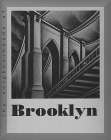
December 1998
Contribution by
Paul Auster
|
The Neighborhoods of Brooklyn
by Citizens Committee for New York City
(Editor), Paul Auster
(Contribution)
"Brooklyn -- famed for its bridge,
its long-departed Dodgers, its Botanic Garden, and its accent -- is the
most populous borough in New York City and arguably the most colorful.
Generously illustrated with both historical and contemporary photographs,
this book is an indispensable and entertaining guide, taking us on a tour
of some 90 neighborhoods (including ghost neighborhoods that no longer
exist) and identifying the boundaries of each one through a neighborhood
profile and a street map. This book promises to be an essential resource
for past, present, and future residents. This book is a joint publication
of the Citizens Committee for New York City and Yale University Press."
Yale University Press
Links
|

March 2000
Co-written by
Paul Auster
|
Double Game & Gotham
Handbook
by Sophie Calle, Paul
Auster
"Whether you're an artist, a writer,
an art lover, a fan of either Sophie Calle or Paul Auster (or both), or
just an observer of life, there is something for you in this beautifully
designed and wonderfully written book. From the elegantly hardcover binding
to the amusingly devised performance art pieces, you can't find any fault
in this book. The first part of the book collects some of Sophie Calle's
own performance art pieces, which were adapted into fiction as part of
the Paul Auster's novel Leviathan. One of my favourite is her collection
of birthday gifts through a span of several years which she kept and displayed
in glass cabinets. The second part is titled the Gotham Handbook, which
chronicles her life based on some 'instructions' she asked Paul Auster
to write for her. This book will make you wonder where is the thin line
between fact and fiction, life and art."
Chiang Hai Tat
Links
|
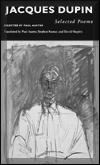
June 1995
Translated by
Paul Auster
|
Jacques Dupin's Selected Poems
Jacques Dupin Germaine Bree (Editor), Paul
Auster (Translator),
David Shapiro (Translator), Stephen Romer (Translator)
"Dupin's poetry brings together fear and desire,
death and life, oppositions which fuse together not out of juxtaposition
but out of a bleeding neccesity for eachother. Death and life do not contrast
in dupin, they are one. Opposing themselves within themselves, self rending
and fusing simulataneously. Parageneous and sublime."
Lightningseed
Links
|

April 1998
Translated by
Paul Auster
|
Chronicle of The Guayaki Indians
by Pierre Clastres, Paul
Auster (Translator)
"Clastres was a French anthropologist who lived with
the Guayaki, a little-known Paraguayan Indian tribe, in the early 1960s.
A decade later, novelist Paul Auster, then living in Paris, was so impressed
by Clastres' extraordinary chronicle, he dedicated himself to translating
it for publication, a mission doomed to failure for 20 years, long enough
for Clastres to die and for the Guayaki to vanish. Auster tells this sad
tale in his introduction, which is essentially a missing chapter from
his memoir, Hand to Mouth , and ends by concluding that at least we have
the book. But this is no mere consolation prize, this is cause for jubilation.
Clastres comes alive in Auster's clarion translation. His frank respect
for the Guayaki enlivens his insightful first-person account of their
experiences together, while scorn for Western stereotyping of "savages"
simmers beneath his riveting interpretation of their cosmology. Clastres'
illuminating report on Guayaki life preserves the spirit of a lost culture
that was in profound accord with the earth."
Donna Seaman
Links
|
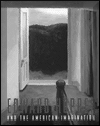
April 1997
Contribution by
Paul Auster
|
Edward Hopper And The American
Imagination
by Deborah Lyons Adam D. Weinberg
Julie Grau (Editor) Contribution by Paul
Auster
"This volume includes fifty-nine of
Hopper's most important works in full color as well as original works
by fiction writers and poets that pay homage to, or make reference to,
the ways in which Hopper pictured our world. Hopper's themes of alienation
and loneliness, empty cityscapes and countrysides, the stark light of
Cape Cod, silent hills and houses - all have been indelibly imprinted
on our collective sense of ourselves and our country. This work celebrates
the impact Hopper's imagery continues to have on contemporary culture
and is dedicated to a fuller understanding of Hopper's place in the American
mind."
Norton
Links
|

February 1998
Translated by
Paul Auster
|
Hunger
by Knut Hamsun, Robert Bly (Translator),
Paul Auster (Translator)
"Set in Norway and Iceland at the beginning of the
eleventh century, this is the story of the beautiful, spoiled Vigdis Gunnarsdatter,
who is casually raped by the man she had wanted to love. A woman of courage
and intelligence, Vigdis is toughened by adversity. Alone she raises the
child conceived in violence, repeatedly defending her autonomy in a world
governed by men. Alone she rebuilds her life and restores her family's
honor, until an unrelenting social code propels her to take the action
that again destroys her happiness. More than a historical romance, Gunnar's
Daughter depicts characters driven by passion and vengefulness, themes
as familiar in Undset's own time - and in ours - as they were in the Saga
Age."
Farrar, Straus & Giroux
Links
|

May 1998
Translated by
Paul Auster
|
If There Were Anywhere but Desert: The
Selected Poems of Edmont Jabes
by Edmond Jabes, Keith Waldrop (Translator), Paul Auster
(Translator)
"This first collection of poetry by
the influential French/Egyptian/Jewish writer, known for a powerful poetic
prose of his own invention (The Book of Questions, etc.), contains early
and late poems, consistently exhibiting styles and themes closely related
to the prose: economy of reference, passionate lyricism, aphoristic tendencies,
preoccupation with the act of writing itself, and the ever-present theme
of exile. Masterfully translated in a bilingual edition with important
contributions by Robert Duncan and Paul Auster."
Links
|
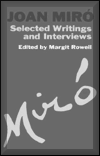
September 1992
Translated by
Paul Auster
|
Joan Miro: Selected Writings and Interviews
by Margit Rowell, Paul
Auster (Translator)
Patricia Mathews (Translator)
"This collection of his writings presents a portrait
of the artist in his own words. Miro's notebooks, letters, and interviews
reveal the work and life of a genius revered for his uncanny expression
of the subconscious."
Da Capo Press
Links
|

August 1994
Co-written by
Paul Auster
|
Paul Auster's City of Glass: A
Graphic Mystery
by Paul
Auster, Art Spiegelman,
Bob Callahan (Editor), David Mazzucchelli
"I cannot possibly offer enough praise for David
Mazzucchelli and Paul Karasik 's adaptation of City of Glass. While some
critics found it to be a dry choice of books to turn into a comics, I
think the interplay between image and text only heightens the original
metafictional narrative. The treatment of the first speech by the crazy
antagonist, Peter Stillman--in which the word balloons trail from random
objects such as a broken television and a bottle of ink--is brilliant.
Neon Lit: Paul Auster's City of Glass deftly illustrates why comics is
a perfect format for exploring fictions about text: the words become visible
objects of the story."
Amazon
Links
|

April 1995
Photography by
Paul Auster
|
I Remember
by Joe Brainard,
Paul Auster
(Photographer)
"In a book which uniquely captures
1950's America, Brainard constructs the story of his life through a series
of brief entries, each beginning with the words "I remember,"
and continues with observations about family, film stars, lust, and the
astonishing New York culture into which he moved to from Tulsa at the
age of 18."
Penguin
Links
|
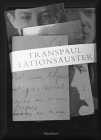
November 1996
Translated by
Paul Auster
|
Translations
by Paul
Auster, Philippe Petit &
Joseph Joubert
"4 books: Joubert, Mallarme, Du Bouchet,
P. Petit. Marsilio is proud to present a collection of works edited and
translated by Paul Auster. Like Auster's own writings, each of these works
in its own way conjures the complexities of language, art, and the nature
of human experience. Taken together, they offer a stunning portrait of
Auster's sensibility."
Marsilio
Links
|
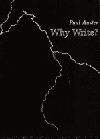
October 1996
Written by
Paul Auster
|
Why Write?
by Paul
Auster
"This snappy, deceptive book grows on you when you
piece together the real point of the 10 or so micro chapters (some are
only a few paragraphs long)- human experience is by nature a series of
surprises and the good writer revels in them. Fans of the film Smoke,
script by the same author, will see how Auster's theory works: the story's
structure consists of surprising turns of events as they thread through
and are integrated by the imagination of the viewer."
Joel Kugelmass
Links
|

March 1995
About
Paul Auster
|
Paul Auster: A Comprehensive Bibliographic Checklist of
Published Works
by William Drenttel
"Compiled and edited by William Drenttel, this book
is the first comprehensive checklist of the works of Paul
Auster. With over 700 entries and
an introduction by Robert Hughes, it records the range of Auster's work
as a novelist, poet, translator and critic. In 100
pages, it covers all written works, editions and states published between
1968-1994, including: books by, edited by or with contributions by Auster;
translations by Auster; contributions to periodicals; reviews and critical
works about Auster; interviews with Auster; screenplays and other printed
adaptations; adaptations for music, dance and theater; broadsides and
ephemera; recorded readings and interviews; works dedicated to Auster;
foreign editions; and a bibliographic chronology. This book is a winner
of the 1995 AIGA 50 Books Design Competition."
William Drenttel
Links
|

|
Thesaurus
Thesaurus is a French compilation of books by Paul Auster.
The first volume contains 'The Invention of Solitude', 'In The Country
of Last Things', 'Moon Palace', 'The Music of Chance', 'Leviathan', 'Smoke',
'The Story of Auggie Wren' and 'Blue in the Face'. The second contains
'The New York Trilogy'.
Links
|
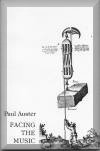
January 1980
Written by
Paul Auster
|
Facing The Music
by Paul Auster
Links
|
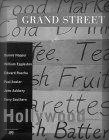
June 1994
Contribution by
Paul Auster
|
Grand Street 49: Hollywood (Summer 1994)
by Jean Stein (Editor), Dennis Hopper (Contributor), Paul
Auster (Contributor)
"A magazine dedicated to art, fiction, non-fiction
and poetry. Grand Street magazine publishes challenging and compelling
work in many different fields--from fiction, poetry and journalism to
cutting-edge art and photography, science and even the occasional celebrity
interview. Grand Street's consistent discovery of original writers and
artists both in the United States and internationally has won the magazine
acclaim as "one of the country's most distinguished literary magazines"
The Los Angeles Times
Links
|
























